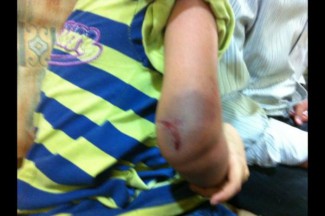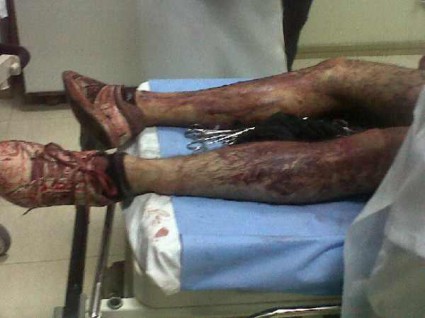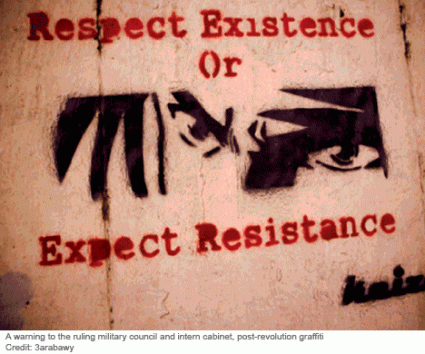Freedom for Abdulhadi Alkhawaja Now!
March 30, 2012 No Comments
Palestinian detainee Hanaa Shalabi Wins Freedom ends hunger strike
Palestinian detainee Hanaa Shalabi ends hunger strike in deportation deal
30 March, 2012 – By AL ARABIYA
A Palestinian woman, Hanaa Shalabi, on hunger strike in protest at her detention without charges by Israel will be deported to the Gaza Strip under a deal ending her fast, the Palestinian prisoner affairs minister said on Thursday.
“Hanaa Shalabi agreed to end her hunger strike following an agreement with Israeli authorities under which she will be exiled to the Gaza Strip,” minister Issa Qaraqaa told AFP.
Shalabi, a 30-year-old from the West Bank, had stopped taking food after Israeli troops seized her in the occupied West Bank on Feb. 16. Her fast lasted for 44 days.
The Palestinian Prisoners’ Club, which tracks detainees in Israeli jails, said Shalabi had agreed to three years’ exile in Gaza, which is geographically separate from the West Bank and under Israeli blockade, “in return for ending her strike and being freed.”
“We accept Hanaa Shalabi’s choice, but deportation can in no way constitute a solution,” the Palestinian Prisoners’ Club said in a statement.”
“She had to accept because Israel put pressure on her. But we are totally opposed to all deportation measures,” the minister added.
Shalabi’s lawyer, Jawwad Boulous, said he did not know when the deal might be implemented given her deteriorating health. She had refused food for 44 days, her representatives said, though Israel’s Prisons Service put the duration at 40 days.
Confirming the agreement, Israel’s military said Shalabi would be deported to Gaza “in the next few days” and that she had promised “to avoid any involvement in terror activity.”
Should Israel deem her to have violated that undertaking it could prosecute her upon her return to the West Bank, the statement said. …more
March 30, 2012 No Comments
Maryam al-Khawaja on the protests in Bahrain
Maryam al-Khawaja on the protests in Bahrain
27 March, 2012 – The Daily Autocrat
Maryam al-Khawaja is currently the Head of Foreign Relations for the Bahrain Center for Human Rights and recently the Gulf Center for Human Rights, and a former Fulbright Scholar at Brown University. In Bahrain, al-Khawaja played an instrumental role in the democratic protests taking place in the Pearl Roundabout in February 2011, which triggered a government response of widespread arrest, discrimination, and fear to suppress dissent and quell voices for reform. She is also the daughter of Abdulhadi al-Khawaja, the founder of the Bahrain Center for Human Rights, who was among a group of high-profile activists and opposition leaders recently sentenced to life imprisonment.
As you may have noticed, things are going incredibly well in Bahrain. Over the past year, protests in the country have been met with a ruthless government response. Today, opposition groups continue to face a brutal crackdown by the ruling al-Khalifa family, which has been able to so far successfully fend off a popular revolt. The United States, our fearless democracy-promoter worldwide, has yet to take on this problem because, as your mother will tell you, it’s much easier to take on the identical problem when it is occurring in countries you don’t like (Syria) or countries where it becomes too big to ignore (Egypt) than it is to do so in countries that, let’s say, house your navy’s Fifth Fleet for instance, or act as a bulwark against regional powers you don’t like. Indeed, democracy promotion isn’t so simple in the case of important allies like Bahrain. It’s incredibly simple everywhere else though, just to be clear. Maryam sat with your correspondent to discuss the worsening situation in Bahrain and the options facing the country at this critical moment.
TDA: Thank you for taking the time to speak with us, Mayram. Of course, a lot has been happening in Bahrain of late. Let’s start by understanding how we got to where we are. In 2001, Bahrain’s ruling Sunni minority oversaw the country’s transformation to a constitutional monarchy with an elected parliament. Seems like the King was being a terrific guy. What has gone wrong?
To begin with I must point out that I find it problematic when the monarchy is referred to as the “Sunni” monarchy or when the protesters as being “Shia”. This gives a wrong indication that the problem in Bahrain is along sectarian lines, which it isn’t. People are not protesting because they are Shiaa, nor are they protesting because the monarchy is Sunni. In reality it is a classic case of oppressors vs oppressed, loyalists vs non-loyalists, with the regime pushing the sectarian card as a means of divide and conquer.
In regards to the happenings in 2001, the issue of reform was quickly put an almost complete stop when the King decided to unilaterally change the constitution. This was despite promises that he would not do so. He crowned himself King, and changed the name of the country to Kingdom of Bahrain. This new constitution instituted an elected lower house with no legislative power, and which also suffers from gerrymandering. It also instituted an upper house, completely assigned by the King.
“People are not protesting because they are Shia, nor are they protesting because the monarchy is Sunni. In reality it is a classic case of oppressors vs oppressed, loyalists vs non-loyalists, with the regime pushing the sectarian card as a means of divide and conquer.”
Basically, long story short, the new regime and constitution built an authoritarian government with the King as head of all government institutions. He issued Decree 56 which granted impunity to all government officials who committed horrific crimes of torture and killings in the 1990’s, some of whom still hold high positions today. Did the human rights situation get better for a little while? Yes, the little while it took for the regime to build up Bahrain as a financial hub, while continuing to repress dissent. Then things went back to the former situation, (there was a violent crackdown which started in August 2010, right before the spark of protests in Tunisia) which led us to where we are today. …more
March 30, 2012 No Comments
Casualities from protests today. Attacks underway on Jabalat Habshi, Sehla, Saar and Salmabad at time of this Report
March 30, 2012 No Comments
18 year old Ahmed Ismael AlSamadi, from Salmabad, shot in the stomach
His life is in danger, didn’t have the heart to take a picture of the wound in his stomach #bahrain 18 year old Ahmed Ismael AlSamadi, from Salmabad, was shot in the stomach
March 30, 2012 No Comments
Head wound victim from village protest, 30 March, 2012
March 30, 2012 No Comments
Attack on Peaceful Protest – 30 March, 2012
March 30, 2012 No Comments
Security Council statement and the changing of the picture regarding Syria
The statement of the Security Council and the changing of the picture
by Wassim Raad – 27 March, 2012 – Voltairenet.org
The Security Council statement in regard to the situation in Syria constituted a decisive turning point in international balances and at the level of the American and Western position towards the events in Syria.
For the first time since the invasion of Iraq, the United States succumbed to the principle of partnership inside the Security Council and recognized the decisive role enjoyed by Russia and China at the level of drafting the UN options. It is also the first time since that date that the Security Council adopts a statement directly featuring the Russian viewpoint.
The statement clearly toppled all the principles which for many years were perceived as being constant and could be recanted at the level of the American and Western positions towards Syria, especially the point featured in the draft resolution drawn up by Saudi Arabia, Qatar, Turkey and France with American support and was blocked by the double Chinese-Russian veto. Indeed, the statement blatantly recognized that any solution in Syria should be the object of understanding with the Syrian government and especially with President Bashar al-Assad, far away from the calls made on him to step down and the attempts to bypass the Syrian national state and it sovereign rights.
This development is not only the result of Russia’s and China’s positions but is primarily the outcome of Syria’s steadfastness in the face of the world war and the support and loyalty shown by the overwhelming majority of the Syrian people towards President Al-Assad and his reformatory program, amidst an American-Western-Turkish recognition of the Syrian army’s cohesion and the escalating collapse and divisions within the ranks of the armed gangs and the opposition political front.
The war on Syria has moved toward a new political stage with a main framework revolving around negotiations between the Syrian national state and UN Envoy Kofi Annan who is carrying conditions that can be the object of compromise but reflect an attempt by the West, its aides and agents to achieve the minimum level of gains following the defeat.
There are attempts to sustain the Gulf and Turkish escalatory positions in order to exert pressures on the negotiations between Syria and the UN envoy on the threshold of the April 1 meeting in Istanbul. In this context, numerous rumors are being spread via the international press about the possible activation of corridor projects across the Turkish border, which is a possibility that was completely thwarted by the Syrian troops – according to the American and French reports – after they gained full control over a 20-kilometer deep strip off the Turkish border, which means that any Turkish action will trigger war with Syria. …more
March 30, 2012 No Comments
Saudis funnel arms to Syria rebels
Saudis seek to funnel arms to Syria rebels
30 March, 2012 – War in Context
The Wall Street Journal reports: Saudi Arabia has pressed Jordan to open its border with Syria to allow weapons to reach rebels fighting President Bashar al-Assad’s regime, officials from both countries say, a move that could buoy Syria’s opposition and harden the conflict in the country and region.
In a March 12 meeting in Riyadh, Saudi Arabia’s King Abdullah asked his Jordanian counterpart to permit weapons shipments into Syria in exchange for economic assistance to Jordan, these officials say. Jordan hasn’t agreed, they said.
Such an agreement could escalate prospects for a broader regional conflict. Syria’s fighting has already added to the rancor between Saudi Arabia and its Gulf Arab allies, who support the country’s largely Sunni opposition, and Shiite Iran, whose government backs Mr. Assad.
The Saudi request adds to sentiment that Arab leaders have hit the wall in their efforts to resolve Syria’s impasse diplomatically. Top officials from Saudi Arabia and other Gulf Arab nations were notably absent from Thursday’s Arab League summit in Baghdad, where leaders called on Damascus to adopt a United Nations plan to stop fighting and begin political dialogue. The plan doesn’t call for Mr. Assad to step aside, as the Arab nations had sought. Mr. Assad said Thursday he would support the U.N. plan, but only once foreign countries stopped aiding rebels.
Many Middle East officials view Saudi Arabia’s arming of Afghan jihadis in the 1980s, through official and unofficial channels, as a prime contributor to the Afghan civil war and the rise of violent Islamic jihad. That has led to worries in many countries over the prospect of Saudi Arabia arming Syrian rebels now. …more
March 30, 2012 No Comments
Sweden weapons profiteering and resignation of Swedish Defense Minister Sten Tolgfors
Swedish minister quits over Saudi deal
30 March, 2012 – Hurriyet International
STOCKHOLM – Reuters – Sweden’s defense minister stepped down yesterday, citing the pressure he has faced from the country’s media over leaked plans to build a weapons plant in Saudi Arabia.
Sten Tolgfors denied any wrongdoing and insisted the plans to help Saudi Arabia build a facility for anti-tank weapons were consistent with a 2005 military agreement between the two countries. Tolgfors, defense minister in the center-right government since 2007, said he had planned to resign anyway, though at a later date.
“The media reports in recent weeks have facilitated and hastened my decision,” he told reporters in Stockholm. Tolgfors was criticized after Swedish public radio, citing leaked documents, reported that Swedish military agencies were in talks to help Saudi Arabia build a facility for repairs and modifications of anti-tank weapons.
Sweden has no ban on weapons exports to Saudi Arabia, but the reports suggested the deal was set up in a way to avoid a public discussion on the issue. Tolgfors defended the plans, saying they were in line with the military cooperation agreement signed by the two countries in 2005 and renewed in 2010. Still, calls for him to resign mounted as the left-wing opposition accused the government of trying to cover-up its involvement in the Saudi plans.
Peace activists who oppose Sweden’s military exports say it’s particularly improper for the country to strike military agreements with non-democratic regimes.
Two criminal investigations were started: One to find out whether a shell company was set up to avoid any direct links between a Swedish military agency and the Saudi regime, and another to determine whether the document leak was a breach of national security.
Prime Minister Fredrik Reinfeldt said Infrastructure Minister Catharina Elmsater-Svard would take over Tolgfors’ defense portfolio until a permanent replacement is appointed.
March 30, 2012 No Comments
Amnesty urges Bahrain to free activist on hunger strike
Amnesty International has demanded the jailed Bahraini human rights activist, Abdulhadi al-Khawaja, be released “immediately and unconditionally”.
Amnesty urges Bahrain to free activist on hunger strike
30 March, 2012 – BBC
Mr Khawaja has been on a hunger strike for the past 51 days and as his condition deteriorates there is growing concern that he may die in prison.
He is refusing food in protest at the life sentence he received in June for allegedly plotting against the state.
Amnesty described his trial by a military court as “grossly unfair”.
His conviction was based on a confession he made under duress, and no evidence was presented showing he had used or advocated violence during the mass protests against King Hamad bin Issa al-Khalifa, it said.
‘Sexual abuse and beatings’
Bahrain has been wracked by unrest since pro-democracy demonstrators occupied a prominent landmark in Manama, Pearl Roundabout, in February 2011. At least 50 people, including five police officers, have been killed, hundreds have been injured and thousands jailed.
The protesters were forcibly driven out of Pearl Roundabout by security forces in March 2011, after King Hamad declared a state of emergency and brought in troops from neighbouring states to crush dissent.
Abdulhadi al-Khawaja told the BBC before his arrest on 8 April that he had deliberately stayed away from Pearl Roundabout. …more
March 30, 2012 No Comments
Al-Khawaja “freedom or death” strike day 51
March 30, 2012 No Comments
Bahrain, King Hamad’s impunity for murder enabled by United States and United Kingdom
Bahrainis protest against use of tear gas
29 March, 2012 – Lebanon Now
Hundreds of Bahrainis staged on Thursday a sit-in outside the offices of the United Nations demanding action over the “excessive” use by police of tear gas against protesters.
Protesters gathered outside the UN house in Manama, in a rally organized by the Shia-led opposition, according to a statement by Al-Wefaq, the main opposition formation.
Police are regularly clashing with protesters who take to the streets in Shia villages despite last year’s brutal crackdown on a month-long protest that demanded democratic change in the Sunni-ruled Gulf monarchy.
Protesters, including men and women, wore medical masks and carried used tear gas canisters of the type reportedly used by police to disperse demonstrations, according to pictures provided by the opposition.
Dozens of used tear gas canisters were also piled up by the protesters outside UN offices, the pictures showed.
Protesters chanted slogans demanding the international community to “take a stance against those crimes, and dangerous violations by Bahraini authorities against unarmed” people, said the statement.
Representatives of the opposition delivered a letter addressed to UN Secretary General Ban Ki-Moon demanding action.
“This excessive use [of tear gas] is a daily flagrant violation to the UN’s Basic Principles on the Use of Force and Firearms by Law Enforcement Officials,” the letter said.
The UN High Commissioner for Human Rights last week criticized Bahraini forces for their “disproportionate use of force” as they sought to quell protests, saying their use of tear gas may have led to over 30 deaths.
“We have been receiving worrying reports of the disproportionate use of force by Bahraini security forces, including the excessive use of tear gas, the use of birdshot pellets and rubber bullets,” said spokesperson Rupert Colville.
March 30, 2012 No Comments
US Policy Makers: Your Policy in Bahrain Has Gone Beyond Tolerance
To the US Policy Makers: Your Policy in Bahrain Has Gone Beyond Tolerance
30 – March, 2012
The message you attempted to convey through your Deputy Ambassador’s visit to the injured regime mercenaries has been received. Now it is our turn to reply.
Since the eruption of the Arab Spring last year, your policies have been full of hypocrisy, supporting popular pro-democracy revolutions only when it would serve your selfish interests. The exact reasons that led to the outbreak of the Arab Spring in Tunisia, Egypt, Libya, Yemen and Syria were applicable to Bahrain, yet you have chosen to side with the illegitimate regime of Al-Khalifa. Your justification to side with the illegitimate regime of Al-Khalifa is completely irrelevant to us. Our people have nothing to do with your conflict with the Islamic Republic of Iran. Your decisions and actions have only made our people more determined to reject your policies and gave them the motive to retaliate in the future, should your current policies persist.
The mercenaries that your Deputy Ambassador has paid her respects to have come all the way from Pakistan and other countries to kill our people; more than eighty have been killed so far. Thousands have been injured by the hand of those mercenaries including women and children, and many credible human rights organizations such as Bahrain Center for Human Rights, HRW, Amnesty International and HRF have comprehensively documented most of the cases.
It would have been more appropriate for your Deputy Ambassador to visit the victims of those mercenaries.
We have pledged to “refuse all forms of foreign intervention, whether direct or indirect” (Lulu Charter, Principle # 4). We consider this visit as an irresponsible act of interference that cannot be overlooked.
As such, the Pearl Revolution Political Center is going to call for a nation-wide anti-US protest campaign that will not spare the illegal presence of your 5th Fleet in our country and the counter-revolution that your embassy has been feeding behind the scene.
Pearl Revolution Political Center
March 28th 2012
…source
March 30, 2012 No Comments
“We are brothers, Sunnis and Shias” – Bahrain revolution defies repression
Bahrain revolution defies repression
30 March, 2012 – By Tony Iltis – GreenLeft AU
On March 14 last year, four days before the NATO intervention in Libya, there was a less publicised Western-supported military intervention. A Saudi-led force invaded Bahrain to put down democracy protests against that country’s absolute monarchy.
Despite the repression, fresh protests have broken out. Press TV said on March 27 that thousands of Bahrainis rallied calling for the overthrow of King Hamad bin Isa and his Al Khalifa dynasty.
The protests were at the funeral of Ahmad Abdul Nabi, killed by tear gas at an earlier demonstration. Deaths through tear gas inhalation are common in Saudi-occupied Bahrain.
On March 26, the Bahrain Centre for Human Rights released a report documenting human rights violations since the publication of the Report of the Bahrain Independent Commission of Inquiry (BICI) last November 2011.
The report is a grim catalogue of extrajudicial killings, arbitrary arrests, torture and excessive use of force, political imprisonment and trials, religious discrimination, kidnappings, politically motivated sackings and harassment of the media.
On March 22, Al-Manar TV reported that Bahraini security forces kidnapped, beat and raped 16-year-old Ali Al-Sankees “due to his refusal to work with the Bahraini forces as an informant”.
Western media has echoed the Bahraini monarchy in characterising the opposition as a sectarian Shiite movement. Bahrain’s ruling elite is drawn from the Sunni minority and the Shiite majority face discrimination.
However, a representative of the Coalition of February 14th Youth told Jadaliyya.com on March 22: “This is a big lie through which the Al-Khalifa regime seeks to mislead international public opinion … The first political prisoner since the revolution started is the Sunni, Muhammad al-Buflasa …
“How can it be called sectarian, when the goal of the revolution is for all citizens, whether Sunni or Shia, to become equal in their rights and duties …
“The most prominent and most important slogan of this revolution is ‘We are brothers, Sunnis and Shias, and we will not sell out this country’.” …source
March 30, 2012 No Comments
Nasrallah slams Arab summit in Iraq for ignoring events in Bahrain
Nasrallah slams Arab summit in Iraq for ignoring events in Bahrain
30 March, 2012 – The Daily Star
BEIRUT: Hezbollah chief Sayyed Hasan Nasrallah said Friday the international community would not intervene militarily in Syria and slammed Arab states for neglecting developments in Bahrain.
“The issue of forcing the collapse of the [Syrian] government by military force is over,” Nasrallah said, pointing to recent regional and international meetings and their outcomes.
“The options of military intervention, arming the opposition or sending in Arab troops are off the table,” the Hezbollah chief said.
He reiterated that only a political solution could resolve the year-long unrest in Lebanon’s neighbor.
“What is needed in Syria is a political solution for the interests of Syria, the Syrian people and Syria’s strategic position,” he said.
“Talk today is on the need for dialogue between the opposition and the government under the leadership of President Bashar Assad,” he added.
He also criticized Thursday’s Arab League summit in Iraq for not placing importance on developments in Bahrain.
“Talk [on Bahrain] is not even allowed,” Nasrallah said.
….source
March 30, 2012 No Comments
Regime Murders, Kidnapping and Chemical Gas Attacks
Bahrain 21-29 March: Death, kidnapping, dismissals and more tear gas
30 March, 2012 – Bahrain Center for Human Rights
Respect for right to life:
Ahmed Abdulnabi AbdulRasool, 30 years old, died on 24 March 2012 due to tear gas suffocation as per his family. Ahmed’s sister is having trouble breathing as well due to the excessive use of tear gas by Bahraini security forces almost on a nightly basis. Ahmed’s family said that he never had any berthing problems until this past week when he suffocated from tear gas twice. Tear gas was shot directly into their home, window broken. After that Ahmed had trouble breathing and was constantly coughing. When his family insisted he go to the hospital he refused, fearing arrest.
Ahmed’s death comes one week after the death of Sabry, who also died of tear gas suffocation. Graphic picture of Ahmed after his death.
Abdat Ali AbdulMohsen from Aali died on 23 March 2012 from tear gas suffocation according to her family. Abda, who is in her 40’s, had suffered from breathing difficulties on the 15th of March, and she was taken to the hospital where she stayed for a week. On the 22nd of March her house was tear gassed again, her health deteriorated quickly and she died on the morning of the 23rd of March.
More than 30 people have died allegedly due to tear gas suffocation since the pro-democracy protests started on February 14th, 2011, from a total of more than 80.
Security forces continued to attack the large crowds participating in the funeral processions of both victims. Tear gas was used excessively; peaceful citizens and houses were targeted with tear gas.
Respect for Rights of the Child:
16 year old Ali AlSingace was kidnapped and found later on 21 March 2012 unconscious in a garage in Sanabis, half naked with his hands tied behind his back. This is the 5th time Ali has been subjected to kidnapping, he claims that they continue to target him due to him refusing to work as an informant. (More details)
A 10 year old child, Abdulla Hasan from Al Hajar was kidnapped on 22 March 2012 and beaten severely by security forces who released him later.
Respect for religious freedom:
Security forces targeted a Shia place of worship (Ma’atam or Hussaineya) in al Ghuraifa village on 24 March 2012 causing it to burn down.
Respect for right to peaceful assembly:
Security forces continued to attack peaceful protests that took place in several areas. A number of injuries were reported as a result of direct shooting of tear gas at the protesters . Injures with birdshots reported, and injured protestors still cannot seek medical care in either public nor private hospitals, for the fear of interrogation and detention by police.
March 30, 2012 No Comments
Secret State Agencies: “No Hard Evidence” Iran Building Nukes
Secret State Agencies: “No Hard Evidence” Iran Building Nukes
March to War Continues
by Tom Burghardt – 5 March, 2012 – Dissident Voice
Although all 16 U.S. secret state intelligence agencies confirmed, again, that “Iran had abandoned its nuclear weapons program years earlier,” reaffirming the “consensus view” of not one, but two National Intelligence Estimates The New York Times reported last week, the march towards war continues.
Last Saturday The Daily Telegraph, citing The Wall Street Journal, reported that “military planners have asked for emergency funding from Congress to address a perceived shortfall in defence capabilities that could undermine the ability of US forces to respond to an Iranian closure of the Strait of Hormuz.”
Plans are underway “to modify weapons systems on ships that are at present vulnerable to Iranian fast-attack boats, many of which carry anti-ship missiles,” the Telegraph averred.
Feeling the heat from pro-Israeli lobby shops and congressional grifters, President Obama told The Atlantic on Friday:
When I say we’re not taking any option off the table, we mean it. I think that the Israeli government recognizes that, as president of the United States, I don’t bluff. I also don’t, as a matter of sound policy, go around advertising exactly what our intentions are. But I think both the Iranian and the Israeli governments recognize that when the United States says it is unacceptable for Iran to have a nuclear weapon, we mean what we say.
In other words, despite repeated assertions by Iran that its nuclear program is strictly for civilian, not military, purposes facts borne out by multiple on-the-ground inspections by the International Atomic Energy Agency and assessments by American spy agencies, the bar for Iranian “compliance” is continually set higher, moved from an “active program” to a mere “capability,” it is now clear that war is the first, last, indeed only “option.”
With this mind, Times’ journalists James Risen and Mark Mazzetti informed us that lying “at the center of the debate is the murky question of the ultimate ambitions of the leaders in Tehran.”
While there is “no dispute among American, Israeli and European intelligence officials that Iran has been enriching nuclear fuel and developing some necessary infrastructure to become a nuclear power,” the Times disclosed that secret state agencies also “believe that Iran has yet to decide whether to resume a parallel program to design a nuclear warhead–a program they believe was essentially halted in 2003 and which would be necessary for Iran to build a nuclear bomb.”
In his January 31 Senate testimony, Director of National Intelligence James Clapper “stated explicitly that American officials believe that Iran is preserving its options for a nuclear weapon, but said there was no evidence that it had made a decision on making a concerted push to build a weapon.” …more
March 30, 2012 No Comments
Systematic indiscriminate chemical gas bombing by MOI Forces of Druaz Village – 16 March, 2012
These frequent attacks through-out Bahrain, transform village homes into deadly “gas chambers” resulting in Chemical Gas poisoning and death from acute respiratory distress
March 30, 2012 No Comments


































